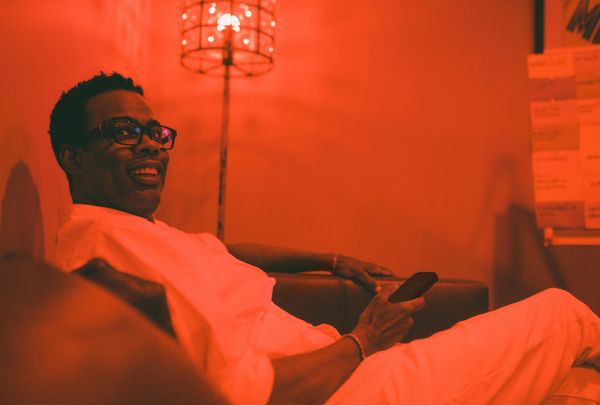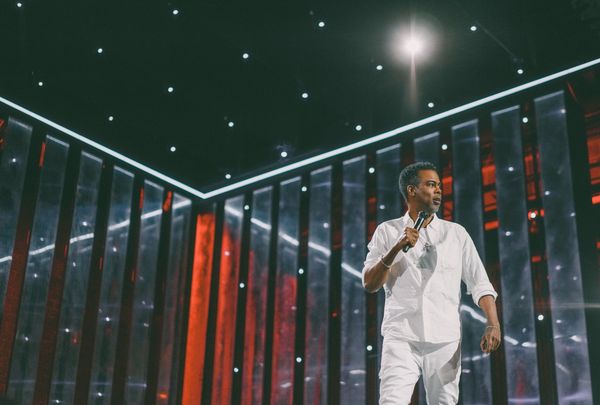
"You know, anybody who says words hurt has never been punched in the face." That is how Chris Rock opens his live Netflix special "Selective Outrage."
Strategically, he waits until the end of his set to land his knockout blows, the reasons the service gambled people would watch. But it took a while to get to it. Segueing from a bit where he praises Beyoncé's beauty while making it clear he wasn't disrespecting Jay-Z – "I do not need another rapper mad at me. . . . I do not need the smoke!" – he opens his examination of last year's Oscars slap by pointing out the size difference between him and Will Smith.
"First of all, I know you can't tell on camera, but Will Smith is significantly bigger than me. We are not the same size, OK? We are not – this guy does movies with his shirt off! You've never seen me do a movie with my shirt off. If I'm in a movie getting open heart surgery, I got on a sweater," Rock says, growing more animated as he continues.
"Will Smith played Muhammad Ali in a movie! Do you think I auditioned for that part? He played Muhammad Ali. I played Pookie in 'New Jack City.' I played a piece of corn in 'Pootie Tang'!"
Size matters in a fight, Rock points out for people to comprehend what it meant to be popped in the face by an action star. "People are like, did it hurt? It still hurts!" he quips before that. "I got 'Summertime' ringing in my ears! But! I'm not a victim, baby. You will never see me on Oprah and Gayle crying. Never gonna happen! I took that hit like Pacquiao, motherf**ker."
Rock waited a year to hit back and chose a significant venue for his counterattack. "Selective Outrage" follows Rock's 2018 Netflix special "Tamborine," part of a $40 million deal he signed in 2016. He performed onstage at the Hippodrome Theatre in Baltimore, MD. Netflix streamed it live globally – a first for the service, which produced the gig as if were a sports event. There was an unnecessary half-hour pre-show hosted by Ronny Chieng featuring bits from Rock's fellow comics and friends Arsenio Hall, Leslie Jones, JB Smoove and Deon Cole.
"Everybody that really knows, knows I had nothing to do with that," Rock says before really roughing it up. "I did not have any entanglement."
A montage of celebrities including Amy Schumer, Matthew McConaughey, Rosie Perez, Woody Harrelson, Sir Paul McCartney, and Wanda Sykes pre-recorded well-wishes for Rock as if he were about to freefall from a skyscraper instead of performing material he's been workshopping for months. There is a tension inherent to live broadcast but here, not so much. Regardless of that, between this and the extended hail-fellow-well-met tight-twos by his buds, the lead-up took on the feeling of a wake or a "get well" rally for someone who recently emerged from a coma.
A post-set breakdown was no better. Hosted by David Spade and Dana Carvey and featuring Yvonne Orji and Kareem Abdul Jabbar alongside Hall and Smoove, the idea was for the comics to lend their expert opinion about each joke – entirely unnecessary, given that they landed as they should have.
Besides, the incendiary fervor of the closing segment eclipses the rest of it in the immediate memory.

"And for people that don't know what everybody knows, Will Smith, his wife was f***ing her son's friend," Rock says. "Now, I normally would not talk about this s**t. But for some reason, these n****s put this s**t on the Internet." He's referring to the 2020 episode of "Red Table Talk" where Smith and Jada Pinkett Smith discuss their separation and her "entanglement" with R&B singer August Alsina.
"She hurt him way more than he hurt me, OK?" Rock continues. "He does that s**t. Everybody in the world called him a b***h." Then Rock provides a short list of potential stops on Smith's fantasy punching tour: Charlamagne Tha God, The Breakfast Club, "The View," "The Talk," every rapper, and the Drink Champs. " . . . And who's he hit? Me. A n***a he knows he can beat. That is some b***h-ass s**t."
Then Rock takes direct shots at Pinkett Smith, saying that in 2016 she opined he should pull out of hosting the Oscars because Smith didn't get nominated for "Concussion." "So did I do some jokes about her? Who gives a f**k? That's how it is. She starts it. I finish it. OK? That's what the f**k happened. Nobody's picking on this b***h. She started this s**t."
Rock, dressed head-to-toe in white save for Prince's symbol dangling from a chain around his neck, has constructed Selective Outrage" to leave the audience stunned, much in the way he must've felt onstage a year ago when Smith struck him on live TV, and in front of some of the most wealthy, famous white people on the planet.
On this Saturday night, the Oscar winner was not there, and the audience filling those seats in Baltimore had far more Black folks in it than his witnesses in the Dolby Theatre one year ago.

But if you want to compare size and impact, the 2022 Oscars drew an audience of 16.6 million. Netflix as a rule doesn't share its audience data (a fact Chieng riffs on in the pre-show) but will giddily remind anyone who asks that it has over 231 million global subscribers. Rock may be smaller in stature, but his reach may ultimately be much wider. We may not ever know for sure.
Everything that comes before the last 10 minutes of "Selective Outrage" is, by the standards of Chris Rock's show at this point in his career, solid if not especially pointed. Rock jokes about the hypocrisy of corporate virtue signaling, spending an extended run cracking on Lululemon for their $100 yoga pants. He cracks on America's attention addiction, calling our social media a bigger problem than opioids.
Everybody's full of s**t, Rock proclaims, hence the name of his special. We are a nation that will play Michael Jackson songs but won't play R. Kelly: "Same crime, one of them just got better songs."
And he uses our attention obsession as a gateway to decry victimhood which could have gone very, very wrong, and he knew it. Being a victim, he says, is the fourth easiest way to gain attention, after being excellent (No. 3), being infamous (No. 2) and showing your ass (No.1).
Rock may be smaller in stature, but his reach may ultimately be much wider. We may not ever know for sure.
"You're like, 'Ooh, where is he going with this?' Don't get me wrong. There's no victim shaming going on. No, no, no, no, no, no, there are real victims in this world. There are people that have gone through unspeakable trauma," he says. "And they need your love, they need your support, they need your care. But if everybody claims to be a victim when the real victims need help, ain't nobody gonna be there to help them. OK? And right now we live in a world where the emergency room is filled up with motherf*****s with paper cuts."
But here is where Rock proves to be a better comedian than others praised for their genius. What's the top group crying "victim"? White men. "Did you see the Capitol riots? White men trying to overthrow the government . . . that they run? What kind of white 'Planet of the Apes' s**t was that?"

Next, he takes a shot at Meghan Markle, mainly over her claim to be shocked that the royal family was racist. "They're the original racists! They invented colonialism! They're the O.G.s of racism! They're the Sugar Hill Gang of racism." Then, since he's Chris Rock, he finds a way to circle back to "Bring the Pain" for a new O.J. joke that still works – because of the Kardashians.
"Selective Outrage" doesn't score a 100 percent hit rate, particularly when Rock tries to establish himself as a transgender ally by painting a hypothetical picture of what would happen if his father were to suddenly come out as trans. While not quite swishing the ball into the transphobia net, let's just say it bounces off the rim. And Rock recognizes this as he stalks the stage; at that moment he glides into a sidestep as if sneaking by something deadly.
That may lead a person to consider whether our expectations are so skewed toward superstar comedians going after marginalized groups in the name of edge that performers like Rock feel the need to touch those red buttons if not slam on them. It's not as if he's obligated to demonstrate how to do a trans joke in a way that isn't demeaning or assaultive.
But since he tries and it doesn't quite work, that trip makes a section featuring personal situational humor about being a rich man with rich daughters sag relative to the rest of the set. For the most part, "Selective Outrage" makes a point of punching up with a series of light, targeted jabs . . . until the final volley.
Rock's long-awaited response is acidic, surgical and emotional enough for him to flub the most searing part of his bit enough to restart it. Per Smith's directions, he keeps Pinkett Smith's name out of his mouth while pointing out that Smith himself practices selective outrage, and the slap is proof of that.
The comic closes the book by answering one of the main questions people have been asking him. "A lot of people go, 'Chris, how come you didn't do nothing back? How come you didn't do nothing back that night? Because I got parents. That's why. Because I was raised. I got parents. And you know what my parents taught me? Don't fight in front of white people."
With that, Rock drops the mic, his outrage vented before Baltimore and the world.
"Chris Rock: Selective Outrage" is available to stream on Netflix.







